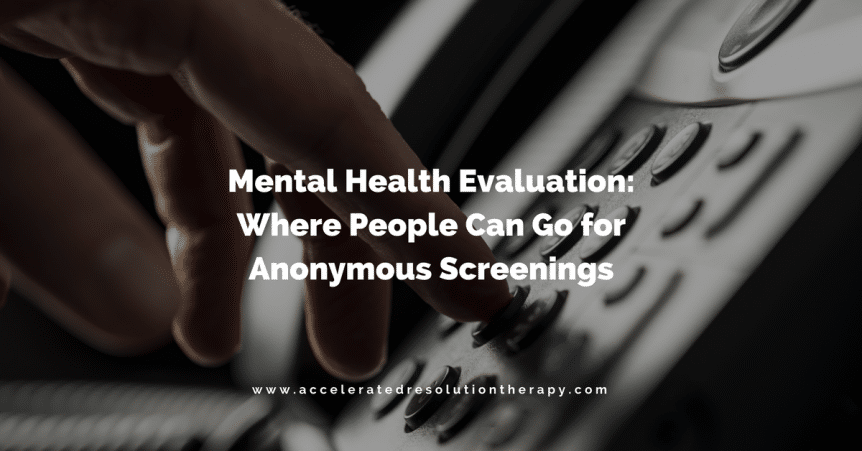Unlike older generations who were afraid to air their “dirty laundry”, most people today feel less inhibited in sharing their deepest feelings and thoughts. However, others don’t feel comfortable broadcasting their personal problems, so they seek anonymity when trying to determine the state of their mental health, as well as get help.
It’s critical for mentally ill people to reach out for help as failing to do so can worsen the condition or even endanger themselves and others. Fortunately, there are several places that offer screenings for mental illness. Here are a few options where people can go to anonymously evaluate their mental health, along with some information for finding help.
Anonymous Online Mental Health Screening
One of the simplest and quickest anonymous ways to learn the condition of someone’s mental health is by taking an online test. After people have been screened, they’re given valuable tools and resources where the results of the test can be discussed with mental health professionals.
There are several types of screenings. Therefore, it’s important to select the one that best fits a condition. For example, people experiencing overwhelming sadness should take the depression screen. For extreme mood swings, there’s the bipolar screen.
People who struggle with traumatic experiences and have PTSD (Post Traumatic Stress Disorder) can take a specific test. Children and teens who battle mental illness can take a youth screen in which they can be evaluated for pediatric symptoms.
Sometimes, parents with problematic children have mental health issues, so they take the parent screen. Furthermore, there are screens for substance and alcohol abuse, psychosis screens and a work health survey.
Anonymous Hotlines
Anonymous hotlines are available that are specific to a wide range of problems, such as those concerning abuse, suicidal thoughts and others calls. Some of the most common anonymous hotlines include:
- The Crisis Call Center (775-784-8090) is open 24/7, year-round, and provides support for people facing any kind of crisis. They assist people in crisis situations by using advanced communication and modern technology.
- The National Suicide Prevention Hotline (800-273-TALK), also open 24/7, connects callers with trained counselors who are skilled in handling crisis circumstances.
- The National Domestic Violence Hotline helps victims of domestic violence. Available 24/7, the hotline (800-799-HELP) is equipped with highly trained workers who provide information, resources and other types of assistance.
- The Depression and Bipolar Support Alliance (800-826-3632) offers education, support and help to people with mood disorders.
Online Support Groups and Chat Rooms
Online support groups and chat rooms are open to everyone and are widely found throughout the web. These are safe places in which participants can share their feelings and stories anonymously. Besides having other anonymous participants, a typical online support group includes a moderator who can direct people to professional help when needed.
Because these online groups usually deal with specific issues, such as addiction, depression, grief and other topics, people need to choose the one that focuses on their particular problem. In addition to groups dealing with depression, some of the most common support groups and chat rooms include those, such as AA (Alcoholics Anonymous), Alanon (for people dealing with friends and family members who are alcoholics or drug addicts), OA (Overeaters Anonymous) and others.
Common Symptoms of Mental Illness
It’s important to recognize some of the common symptoms of mental illness. These signs include:
- Constant feelings of sadness, hopelessness and guilt
- Excessive worries, fears and anxiety
- Changes in sleep patterns and lack of energy
- Noticeable irritability and restlessness
- Losing interest in activities that once brought pleasure
- Weight gain or loss
- Changes in appetite or unusual eating habits
- Death or suicidal thoughts
- Being unable to concentrate or make decisions
- Social withdrawal
No one has to be ashamed of having mental health issues. The good news is that depression, anxiety and other types of mental health conditions are highly treatable. Don’t hesitate to call a therapist that has been trained in Accelerated Resolution Therapy where everything that’s shared is confidential. Maybe you’re a therapist or just someone who enjoys helping people. Please contact us and find out more about upcoming trainings and other services.

